初中英语近义词辨析专项练习题
- 格式:docx
- 大小:79.47 KB
- 文档页数:26
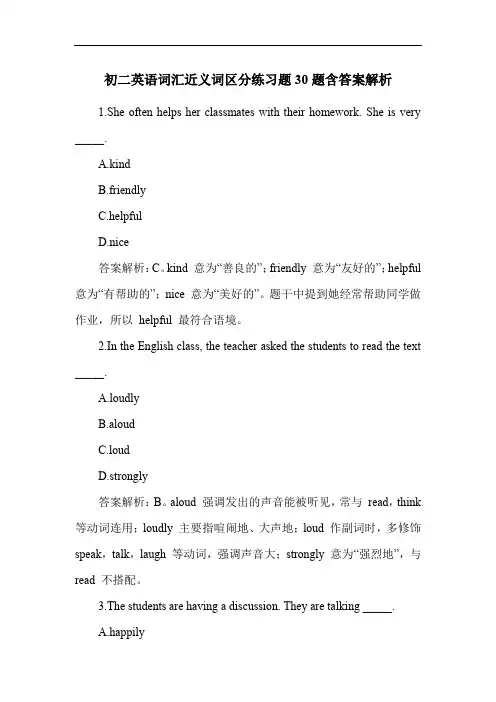
初二英语词汇近义词区分练习题30题含答案解析1.She often helps her classmates with their homework. She is very _____.A.kindB.friendlyC.helpfulD.nice答案解析:C。
kind 意为“善良的”;friendly 意为“友好的”;helpful 意为“有帮助的”;nice 意为“美好的”。
题干中提到她经常帮助同学做作业,所以helpful 最符合语境。
2.In the English class, the teacher asked the students to read the text _____.A.loudlyB.aloudC.loudD.strongly答案解析:B。
aloud 强调发出的声音能被听见,常与read,think 等动词连用;loudly 主要指喧闹地、大声地;loud 作副词时,多修饰speak,talk,laugh 等动词,强调声音大;strongly 意为“强烈地”,与read 不搭配。
3.The students are having a discussion. They are talking _____.A.happilyB.loudlyC.quicklyD.slowly答案解析:A。
happily 意为“高兴地”;loudly 意为“大声地”;quickly 意为“快速地”;slowly 意为“慢慢地”。
题干中说学生们在讨论,通常会是愉快地交谈,所以happily 更符合。
4.The teacher praised him for his hard work. He studies _____.A.carefullyB.diligentlyC.seriouslyD.attentively答案解析:B。
carefully 意为“仔细地”;diligently 意为“勤奋地”;seriously 意为“严肃地”;attentively 意为“专心地”。
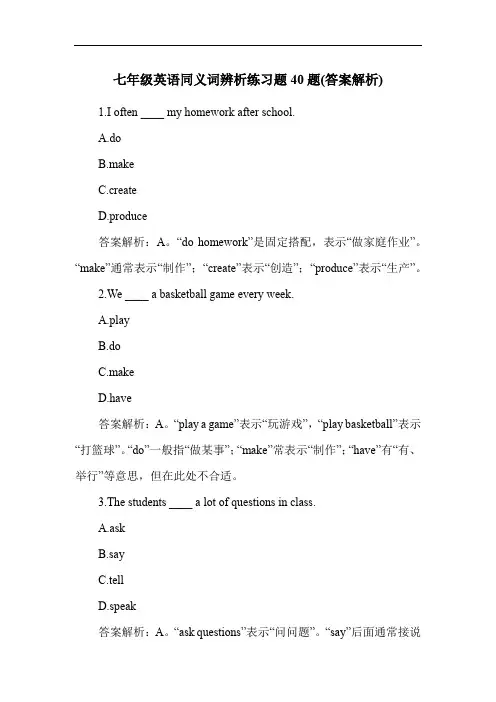
七年级英语同义词辨析练习题40题(答案解析)1.I often ____ my homework after school.A.doB.makeC.createD.produce答案解析:A。
“do homework”是固定搭配,表示“做家庭作业”。
“make”通常表示“制作”;“create”表示“创造”;“produce”表示“生产”。
2.We ____ a basketball game every week.A.playB.doC.makeD.have答案解析:A。
“play a game”表示“玩游戏”,“play basketball”表示“打篮球”。
“do”一般指“做某事”;“make”常表示“制作”;“have”有“有、举行”等意思,但在此处不合适。
3.The students ____ a lot of questions in class.A.askB.sayC.tellD.speak答案解析:A。
“ask questions”表示“问问题”。
“say”后面通常接说话的内容;“tell”表示“告诉”;“speak”一般表示“说某种语言”。
4.The teacher ____ us to be quiet.A.tellsB.saysC.asksD.speaks答案解析:A。
“tell sb to do sth”表示“告诉某人做某事”。
“say”后面接说话的内容;“ask”后面常接人再接“to do sth”,但此处语境不合适;“speak”一般表示“说某种语言”。
5.We ____ English every day.A.speakB.talkC.sayD.tell答案解析:A。
“speak English”表示“说英语”。
“talk”一般与“about/with/to”等搭配;“say”后面接说话的内容;“tell”表示“告诉”。
6.The boy ____ goodbye to his friends.A.saysB.tellsC.speaksD.talks答案解析:A。
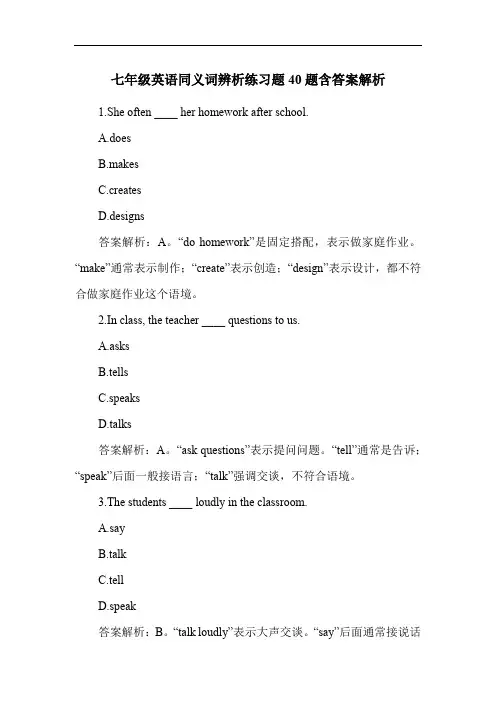
七年级英语同义词辨析练习题40题含答案解析1.She often ____ her homework after school.A.doesB.makesC.createsD.designs答案解析:A。
“do homework”是固定搭配,表示做家庭作业。
“make”通常表示制作;“create”表示创造;“design”表示设计,都不符合做家庭作业这个语境。
2.In class, the teacher ____ questions to us.A.asksB.tellsC.speaksD.talks答案解析:A。
“ask questions”表示提问问题。
“tell”通常是告诉;“speak”后面一般接语言;“talk”强调交谈,不符合语境。
3.The students ____ loudly in the classroom.A.sayB.talkC.tellD.speak答案解析:B。
“talk loudly”表示大声交谈。
“say”后面通常接说话的内容;“tell”表示告诉;“speak”强调说话的动作或说某种语言。
4.We ____ English in class.A.sayB.talkC.tellD.speak答案解析:D。
“speak English”表示说英语。
“say”后面接说话的内容;“talk”强调交谈;“tell”表示告诉。
5.The teacher ____ the students to be quiet.A.tellsB.saysC.talksD.asks答案解析:A。
“tell sb. to do sth.”表示告诉某人做某事。
“say”后面接说话的内容;“talk”强调交谈;“ask”通常是问问题。
6.The boy ____ a story to his classmates.A.tellsB.saysC.talksD.speaks答案解析:A。
“tell a story”表示讲故事。
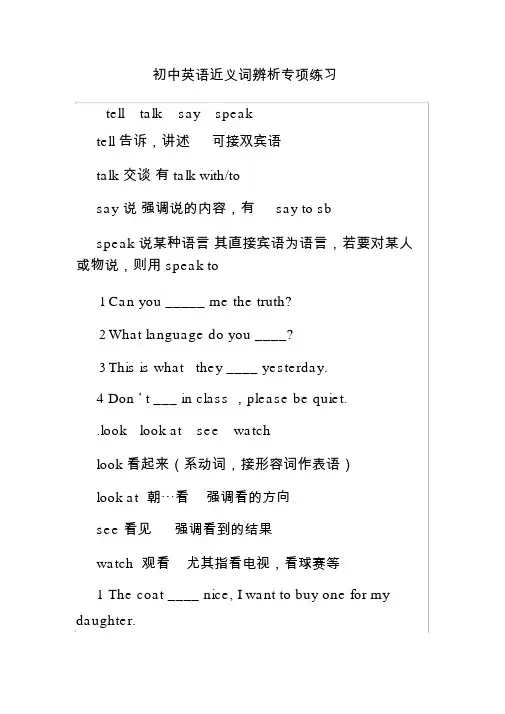
初中英语近义词辨析专项练习tell talk say speaktell 告诉,讲述可接双宾语talk 交谈有 talk with/tosay 说强调说的内容,有say to sbspeak 说某种语言其直接宾语为语言,若要对某人或物说,则用 speak to1Can you _____ me the truth?2What language do you ____?3This is what they ____ yesterday.4 Don ’ t ___ in class ,please be quiet..look look at see watchlook 看起来(系动词,接形容词作表语)look at 朝⋯看强调看的方向see 看见强调看到的结果watch 观看尤其指看电视,看球赛等1 The coat ____ nice, I want to buy one for my daughter.2 Please _______ the blackboard, can you ___anything?3 She doesn ’liket ____ TV,but she likes _____ football game..sound listen to hearsound 听起来(系动词,接形容词作表语)listen to听强调听的动作与方向hear 听见强调听的结果1 ____ the radio, it says the flood is coming soon.2 I can’ t you , because there ’something wrong with my ears.3 What you said ____ interesting..hear from hear ofhear from收到⋯的来信hear of听说⋯的消息1 After ____ her sister, she read and soon wrote back.2 Have you _____ the place called Shenglong?.receive acceptreceive 收到强调收的动作accept 接受,收下强调收的结果He ____ _ a present yesterday, but he didn ’ t _____ it, because it was too much expensive and he sent it back..look up look for find find outlook up 查词典、书、电话簿等,代词放中间look for 寻找强调找的动作find 找到强调结果find out 发现结果是指经过调查、研究、分析或判断等努力而发现的结论1 He often takes a dictionary and ______ the new words in it?2 The little girl _____ her pen everywhere but didn ’ t _____ it at last.3 Look! Rita is crying over there. Let ’gos and_____ why is she crying..keep borrow lendkeep 借是一个延续性动词borrow 借(进)强调从别人那里借来,有 borrow ⋯fromlend 借(出)强调将东西借给别人,有lend⋯to1 –My bike is broken, can I ___ yours ,Lily?-Oh, sorry, I’ ve ____ it to Sandy.2 –How long may I ____ this book?-For about two weeks..reach arrive getreach 到达,够得着是个及物动词arrive 到达不及物动词,有arrive in/ atget 到达不及物动词,有get to1 They will ____ in Chengdu next week.2 How do you ___ to school every day?3 Use a longer stick, then you can ____ the apples..thanks to thanks forthank to幸亏,由于thanks for因⋯谢谢1______ your help, I’ ve understand it.2______ the cats, mice dare not come and eatmy food..give in give upgive in 投降give up 放弃代词放中间,后面可接动词 -ing 分词1 We shouldn ’ t _____ learning English!2 I would rather die than _____ before my enemies..achieve come trueachieve 实现(理想、愿望、预言等)及物动词,主语一般为人come true 实现不及物动词组一般由物(理想、愿望、预言等)作主语1 He works so hard that he is sure to___ his dream.2 His prediction of human’ s flying to the moon _____..turn off close turn on openturn off 关(电器)close 关(门、窗、书等)turn on 开(电器)open 开(门、窗、书等)1_____ the windows please,it ’ s so cold outside.2____ the lights before you leave the room.3The dog _____ the box and took the bone out!4_____ the TV, I want to watch the NBA basketball games..break off break out break into break downbreak off中断关系,突然终止break out指战争爆发break into非法进入或闯入break down坏掉,(车、船等)抛锚,中途不工作1 He was late for school yesterday, because hiscar ____ on the half way.2 The World War Ⅱ ____ when she was only five.3 They ____ their friendship and didn ’talk toeach other any more.4 Last night a thief _____ my house and tookaway my TV.. solve reply answersolve 解决(问题)及物动词常与problem连用reply 回复,答复不及物动词常与to连用answer 回答及物动词常与question连用1 What did Mr Smith ____ to what others said?2 No one in our class can ______ this question.3 It ’toos difficult for everyone to ______thatproblem..hope wishhope 希望指较为现实的想法常有hope to do 或hope + 从句,但没有 hope sb to dowish 希望指不太现实的要求或想法有wish to do 或 wish sb to do 。
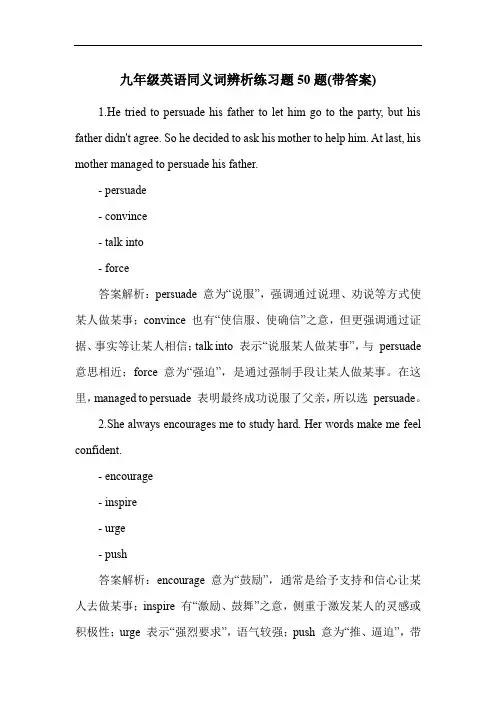
九年级英语同义词辨析练习题50题(带答案)1.He tried to persuade his father to let him go to the party, but his father didn't agree. So he decided to ask his mother to help him. At last, his mother managed to persuade his father.- persuade- convince- talk into- force答案解析:persuade 意为“说服”,强调通过说理、劝说等方式使某人做某事;convince 也有“使信服、使确信”之意,但更强调通过证据、事实等让某人相信;talk into 表示“说服某人做某事”,与persuade 意思相近;force 意为“强迫”,是通过强制手段让某人做某事。
在这里,managed to persuade 表明最终成功说服了父亲,所以选persuade。
2.She always encourages me to study hard. Her words make me feel confident.- encourage- inspire- urge- push答案解析:encourage 意为“鼓励”,通常是给予支持和信心让某人去做某事;inspire 有“激励、鼓舞”之意,侧重于激发某人的灵感或积极性;urge 表示“强烈要求”,语气较强;push 意为“推、逼迫”,带有一定的强迫性。
这里说她的话让“我”有信心努力学习,是鼓励的作用,所以选encourage。
3.The teacher explained the problem clearly. After that, I understood it.- explain- clarify- illustrate- interpret答案解析:explain 意为“解释”,较为常用;clarify 有“澄清、阐明”之意,强调使事情更加清晰;illustrate 表示“举例说明、图解”;interpret 意为“解释、口译”,通常用于对语言、行为等的解释。
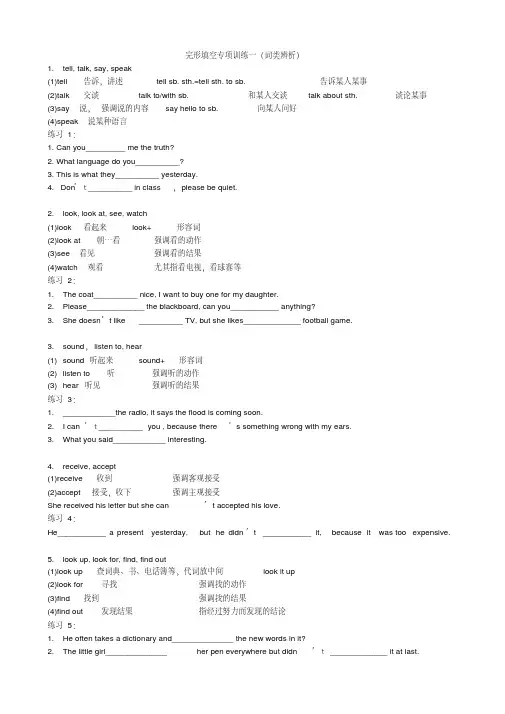
完形填空专项训练一(词类辨析)1.tell, talk, say, speak(1)tell 告诉,讲述 tell sb. sth.=tell sth. to sb. 告诉某人某事(2)talk 交谈 talk to/with sb.和某人交谈 talk about sth. 谈论某事(3)say 说,强调说的内容 say hello to sb. 向某人问好(4)speak 说某种语言练习1:1. Can you_________ me the truth?2. What language do you__________?3. This is what they__________ yesterday.4. Don’t__________ in class,please be quiet.2.look, look at, see, watch(1)look 看起来 look+形容词(2)look at 朝…看强调看的动作(3)see 看见强调看的结果(4)watch 观看尤其指看电视,看球赛等练习2:1.The coat__________ nice, I want to buy one for my daughter.2.Please_____________ the blackboard, can you___________ anything?3.She doesn’t like__________ TV, but she likes_____________ football game.3.sound,listen to, hear(1)sound 听起来 sound+形容词(2)listen to 听强调听的动作(3)hear 听见强调听的结果练习3:1.____________the radio, it says the flood is coming soon.2.I can’t__________ you , because there’s something wrong with my ears.3.What you said____________ interesting.4.receive, accept(1)receive 收到强调客观接受(2)accept 接受,收下强调主观接受She received his letter but she can’t accepted his love.练习4:He___________ a present yesterday, but he didn’t ___________ it, because it was too expensive.5.look up, look for, find, find out(1)look up 查词典、书、电话簿等,代词放中间 look it up(2)look for 寻找强调找的动作(3)find 找到强调找的结果(4)find out 发现结果指经过努力而发现的结论练习5:1.He often takes a dictionary and______________ the new words in it?2.The little girl______________ her pen everywhere but didn’t_____________ it at last.3.Look! Lucy is crying over there. Let’s go and_____________ why is she crying.6.keep, borrow, lend(1)keep 借可以保留一段时间(2)borrow 借强调将东西接进来 borrow...from 从......借来(3)lend 借强调将东西借出去 lend...to 借给练习6:1. ---My bike is broken, can I___________ yours ,Lily?---Oh, sorry, I’ve_________ it to Sandy.2. You can___________ my recorder for three days.3. We often___________ books from our school library.4. He often___________ money to his brother.7.reach, arrive, get(1)reach 到达,够得着是个及物动词(2)arrive 到达不及物动词 arrive in+大地点 arrive at+小地点(3)get 到达不及物动词 get to到达练习7:1.They will__________ in Chengdu next week.2.How do you ____________to school every day?e a longer stick, then you can____________ the apples.8.thanks to, thanks for(1)thank to 幸亏,由于(2)thanks for 因…谢谢练习8:1.___________ your help, I’ve understa nd it.2._____________ the cats, mice dare not come and eat my food.9.give in, give up(1)give in 投降(2)give up 放弃 give up doing sth. 放弃做某事练习9:1.We shouldn’t____________ learning English!2.I would rather die than ____________ before my enemies.10.achieve, come true(1)achieve 实现(理想、愿望、预言等)及物动词,主语一般为人(2)come true 实现不及物动词组,主语为梦想,理想练习10:1.He works so hard that he is sure to____________ his dream.2.His prediction of human’s flying to the moon __________________.11.turn off, close, turn on, open(1)turn off 关(电器) turn on 开(电器)。
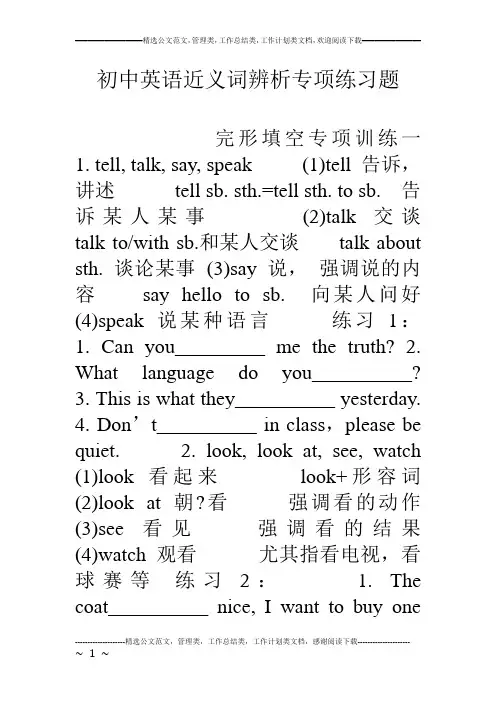
初中英语近义词辨析专项练习题完形填空专项训练一1. tell, talk, say, speak (1)tell 告诉,讲述tell sb. sth.=tell sth. to sb. 告诉某人某事(2)talk 交谈talk to/with sb.和某人交谈talk about sth. 谈论某事(3)say 说,强调说的内容say hello to sb. 向某人问好(4)speak 说某种语言练习1:1. Can you_________ me the truth? 2. What language do you__________?3. This is what they__________ yesterday.4. Don’t__________ in class,please be quiet. 2. look, look at, see, watch(1)look 看起来look+形容词(2)look at 朝?看强调看的动作(3)see 看见强调看的结果(4)watch 观看尤其指看电视,看球赛等练习2: 1. The coat__________ nice, I want to buy onefor my daughter. 2. Please_____________ the blackboard, can you___________ anything? 3. She doesn’t like__________ TV, but she likes_____________ football game.3. sound,listen to, hear (1) sound 听起来sound+形容词(2) listen to 听强调听的动作(3) hear 听见强调听的结果练习3: 1. ____________the radio, it says the flood is coming soon. 2. I can’t__________ you , because there’s something wrong with my ears. 3. What you said____________ interesting.4. receive, accept (1)receive 收到强调客观接受(2)accept 接受,收下强调主观接受She received his letter but she can’t accepted his love. 练习4:He___________ a present yesterday, but he didn’t ___________ it, because it was too expensive.5. look up, look for, find, find out(1)look up 查词典、书、电话簿等,代词放中间look it up (2)look for 寻找强调找的动作(3)find 找到强调找的结果(4)find out 发现结果指经过努力而发现的结论练习5:1. He often takes a dictionary and______________ the new words in it?2. The little girl______________ her pen everywhere but didn’t_____________ it at last.3. Look! Lucy is crying over there. Let’s go and_____________ why is she crying. 6. keep, borrow, lend(1)keep 借可以保留一段时间(2)borrow 借强调将东西接进来borrow...from从......借来(3)lend 借强调将东西借出去lend...to借给练习6: 1. ---My bike is broken, can I___________ yours ,Lily? ---Oh, sorry, I’ve_________ it to Sandy. 2. You can___________ my recorder for three days. 3. We often___________ books from our school library. 4. Heoften___________ money to his brother.7. reach, arrive, get (1)reach 到达,够得着是个及物动词(2)arrive 到达不及物动词arrive in+大地点arrive at+小地点(3)get 到达不及物动词get to到达练习7: 1. They will__________ in Chengdu next week. 2. How do you ____________to school every day? 3. Use a longer stick, then you can____________ the apples. 8. thanks to, thanks for (1)thank to 幸亏,于(2)thanks for 因?谢谢练习8: 1. ___________ your help, I’ve understand it.2. _____________ the cats, mice dare not come and eat my food. 9. give in, give up (1)give in 投降(2)give up 放弃give up doing sth. 放弃做某事练习9: 1. We shouldn’t____________ learning English! 2. I would rather die than ____________ before my enemies. 10. achieve,come true (1)achieve 实现及物动词,主语一般为人(2)come true 实现不及物动词组,主语为梦想,理想练习10: 1. He works so hard that he is sure to____________ his dream. 2. His prediction of human’s flying to the moon __________________.11. turn off, close, turn on, open(1)turn off 关turn on 开(2)close 关open 开练习11: 1. _______________ the windows please, it’s so cold outside. 2. ____________ the lights before you leave the room. 3. The dog ____________ the box and took the bone out! 4. _____________ the TV,I want to watch the NBA basketball games.12. break off, break out, break into, break down (1)break off 中断关系,突然终止(2)break out 指战争爆发(3)break into 非法进入或闯入(4)break down 坏掉,抛锚,中途不工作练习12: 1 He was late for school yesterday, becausehis car ____ on the half way. 2 The World WarⅡ____ when she was only five.3 They ____ their friendship and didn’t talk to each other any more.4 Last night a thief _____ my house and took away my TV. 13. reply, answer, solve (1)reply 回复,答复不及物动词reply to sb. (2)answer 回答,答案及物动词answer question (3)solve 解决,处理及物动词solve problem 练习13: 1. What did Mr. Smith___________ to what others said? 2. No one in our class can__________ this question. 3. It’s too difficult for everyone to___________ that problem. 4. She failed to ____________ my question.5. We haven’t __________ to his letter yet.6. None of us knew the ____________ to the problem. 14. hope, wish (1)hope 希望,指较为现实的想法hope to do 或hope + 从句,但没有hope sb to do (2)wish 希望,指不太现实的要求或想法wish to do 或wish sb to do 练习14: 1. ---The weather may be fine tomorrow. ---I_________ so.3. Mum _________me to be a doctor in the future.4. How I_________I could fly to the moon! 15. take, cost, spend, pay (1)take 花费, 尤指花费时间,主语为物it takes sb. some time to do sth. (2)cost 花费, 指花金钱,主语为物sth. cost sb. some money (3)spend 花费, 主语为人spend...(in) doing 或spend...on sth.(4)pay 花费, 主语为人pay for 练习15: 1. It often_____________ about 3 hours to get to school from my home. 2. ---Who will ____ for the bill? ---Maybe our boss. 3. The house_________ him 30,000 dollars.4. His cousin__________ the whole day making the toy car yesterday. 16. take part in, join, attend (1)take part in 参加某项活动(2)join指参加某组织,成为其中的一个成员(3)attend指参加会议,婚礼,葬礼,典礼;去上课,上学,听报告等练习16:1. Mr. Wang____________ the Party 5 years ago. 2. They invited Lily_____________________ the English evening. 3. He’ll _________ an important meeting tomorrow. 17. do with,deal with(1)do with 处理,应付在问句中要与what 连用(2)deal with 处理,对付在问句中要与how连用练习17: 1. How can you______________ that problem? 2. What do you______________ the event?18. put on, wear, dress, in (1)put on 穿上强调穿衣的动作(2)wear 穿着强调穿的状态,是一个延续性动词(3)dress 给?穿衣服宾语为人dress oneself 给某人自己穿衣服(4)in 穿着强调穿戴的状态be in+颜色练习18: 1. ___________ the warm clothes, it’s coldoutside. 2. Mary is always_________ red clothes . Maybe red is her favorite color. 3. The little boy could____________ himself when he was three years old. 4. The old man___________ a pair of glasses.19. win, beat,defeat (1) win 赢得一般指赢得比赛,奖品或战斗,宾语为物(2) beat 战胜,打败一般指打败参加比赛或游戏的人或团体,宾语为人(3)defeat 战胜,打败一般指战场上打败敌人,宾语为人练习19:1. Our team has___________ the football match, we are all happy. 2. The Brazilian football team________ us 5-0 in that match, all the Chinese fans were very sad. 3. The army___________ the enemy at last. 20. be made in, be made of, be made from, be made up of (1)be made in 在哪里制作,后面接产地(2)be made of ?制成,看得出原料(3)be made from?制成,看不出原料(4)be made up of?组成,强调个体组成整体练习20:1. The desk__________________ wood.2. This kind of watch___________________ Shanghai.3. Our class _________________ 50 students.4. Paper_____________________ bamboo.21. have been to, have gone to(1)have been to 曾经去过,可与次数连用(2)have gone to已经去了练习21:1. They _________________ Italy for more than 7 years, so Italy is their second home. 2. ---How many times_____________________ Hainan? ---Only 3 times. 22. too much, much too, too many, many too (1)too much 太多too much+不可数名词(2)much too 太...... much too+形容词(3)too many 太多too many+可数名词复数(4)many too 用法不存在练习22: 1. The computer is________________ expensive. 2. Stop, Peter. You talked _____________. 3. Don’t eat____________ apples every day. , have a rest. You’ve ______________ tired today. up! You have wasted _________________ time.23. many, much , lots of , a lot ( of ) (1)many 许多many+可数名词复数(2)much 许多much+不可数名词(3)a lot of/lots of 许多a lot of/lots of+可数名词复数/不可数名词(4)a lot 很,非常 a lot 修饰动词练习23: 1. ____________ of the visitors are workers. 2. Has Jack have _____________ money? 3. During those three weeks, he ate ______________ meat. 4. I did not understand why you had so ______________ strange questions. 5. Although he is a boy, he reads ______________. 24. above all,after all,first of all,at all, in all (1)above all最重要的是, 尤其是,强调要引起特别注意(2) after all毕竟, 终究(3) first of all首先, 强调次序(4) at all根本,丝毫否定+at all (5)in all总共, 总计练习25:1. Never waste anything, but _______________ never waste time.2. ______________, let me introduce myself to you.3. There are 35 students_____________ in our class.4. He is still a child _____________. Don’t blame him. don’t know him ______________. 26. passed, past (1)passed 经过动词pass的过去式或过去分词(2)past经过介词或副词练习26: 1. They hurried _____________ the building. 2. Tom ____________ by me without greeting just now. 3. The train for the small town leaves at ten __________ eight. 4. Two weeks had ____________ since Martin had seen him.5. In the _________, I have had many jobs. 27. agree to, agree with, agree on (1) agree to表示一方提出一项建议、安排、计划等,另一方同意协作(2) agree with表示同意某人或某人的意见、想法、分析、解释等;“适合”的意思。
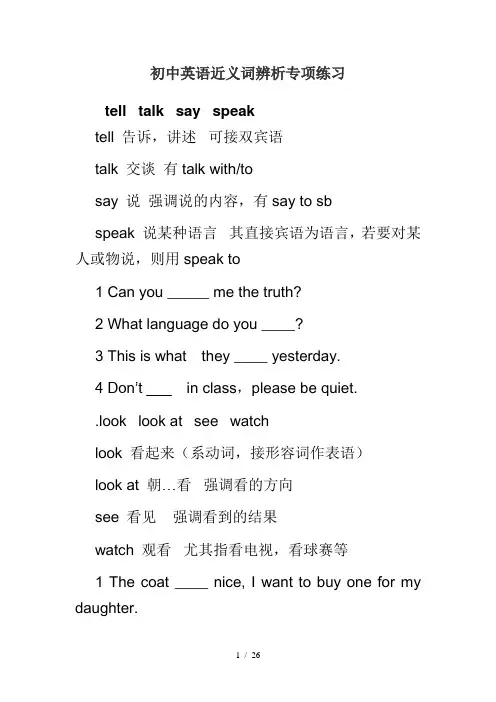
初中英语近义词辨析专项练习tell talk say speaktell 告诉,讲述可接双宾语talk 交谈有talk with/tosay 说强调说的内容,有say to sbspeak 说某种语言其直接宾语为语言,若要对某人或物说,则用speak to1 Can you _____ me the truth?2 What language do you ____?3 This is what they ____ yesterday.4 Don’t ___in class,please be quiet..look look at see watchlook 看起来(系动词,接形容词作表语)look at 朝…看强调看的方向see 看见强调看到的结果watch 观看尤其指看电视,看球赛等1 The coat ____ nice, I want to buy one for my daughter.2 Please _______ the blackboard, can you ___ anything?3 She doesn’t like ____ TV,but she likes _____ football game..sound listen to hearsound 听起来(系动词,接形容词作表语)listen to 听强调听的动作与方向hear 听见强调听的结果1 ____ the radio, it says the flood is coming soon.2 I can’t ____ you , because there’s something wrong with my ears.3 What you said ____ interesting..hear from hear ofhear from 收到…的来信hear of 听说…的消息1 After ____ her sister, she read and soon wrote back.2 Have you _____ the place called Shenglong?.receive acceptreceive 收到强调收的动作accept 接受,收下强调收的结果He _____ a present yesterday, but he didn’t _____ it, because it was too much expensive and he sent it back..look up look for find find outlook up 查词典、书、电话簿等,代词放中间look for 寻找强调找的动作find 找到强调结果find out 发现结果是指经过调查、研究、分析或判断等努力而发现的结论1 He often takes a dictionary and ______ the new words in it?2 The little girl _____ her pen everywhere but didn’t _____ it at last.3 Look! Rita is crying over there. Let’s go and _____ why is she crying..keep borrow lendkeep 借是一个延续性动词borrow 借(进)强调从别人那里借来,有borrow… fromlend 借(出)强调将东西借给别人,有lend …to1 – My bike is broken, can I ___ yours ,Lily?-Oh, sorry, I’ve ____ it to Sandy.2 –How long may I ____ this book?-For about two weeks..reach arrive getreach 到达,够得着是个及物动词arrive 到达不及物动词,有arrive in/ atget 到达不及物动词,有get to1 They will ____ in Chengdu next week.2 How do you ___ to school every day?3 Use a longer stick, then you can ____ the apples..thanks to thanks forthank to 幸亏,由于thanks for 因…谢谢1 ______ your help, I’ve understand it.2 ______ the cats, mice dare not come and eat my food..give in give upgive in 投降give up 放弃代词放中间,后面可接动词-ing分词1 We shouldn’t _____ learning English!2 I would rather die than _____ before my enemies..achieve come trueachieve 实现(理想、愿望、预言等)及物动词,主语一般为人come true 实现不及物动词组一般由物(理想、愿望、预言等)作主语1 He works so hard that he is sure to___ his dream.2 His prediction of human’s flying to the moon _____..turn off close turn on openturn off 关(电器)close 关(门、窗、书等)turn on 开(电器)open 开(门、窗、书等)1 _____ the windows please, it’s so cold outside.2 ____ the lights before you leave the room.3 The dog _____ the box and took the bone out!4 _____ the TV, I want to watch the NBA basketball games..break off break out break into break down break off 中断关系,突然终止break out 指战争爆发break into 非法进入或闯入break down 坏掉,(车、船等)抛锚,中途不工作1 He was late for school yesterday, because his car ____ on the half way.2 The World WarⅡ____ when she was only five.3 They ____ their friendship and didn’t talk to each other any more.4 Last night a thief _____ my house and took away my TV.. solve reply answersolve 解决(问题)及物动词常与problem 连用reply 回复,答复不及物动词常与to连用answer 回答及物动词常与question 连用1 What did Mr Smith ____ to what others said?2 No one in our class can ______ this question.3 It’s to o difficult for everyone to ______ that problem..hope wishhope 希望指较为现实的想法常有hope to do 或hope + 从句,但没有hope sb to dowish 希望指不太现实的要求或想法有wish to do 或wish sb to do。
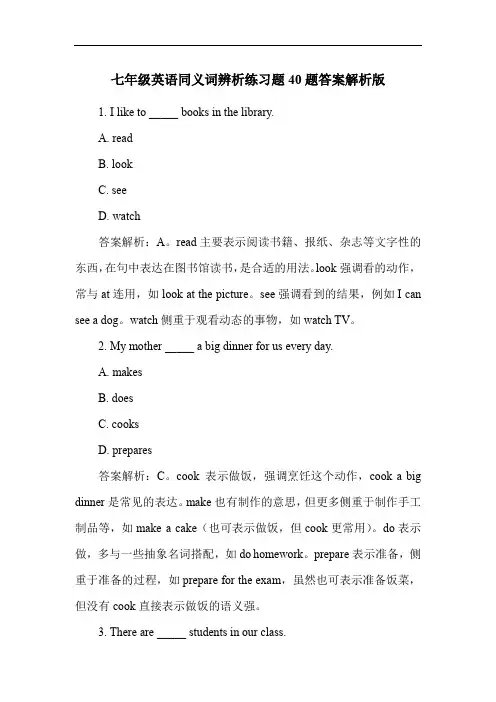
七年级英语同义词辨析练习题40题答案解析版1. I like to _____ books in the library.A. readB. lookC. seeD. watch答案解析:A。
read主要表示阅读书籍、报纸、杂志等文字性的东西,在句中表达在图书馆读书,是合适的用法。
look强调看的动作,常与at连用,如look at the picture。
see强调看到的结果,例如I can see a dog。
watch侧重于观看动态的事物,如watch TV。
2. My mother _____ a big dinner for us every day.A. makesB. doesC. cooksD. prepares答案解析:C。
cook表示做饭,强调烹饪这个动作,cook a big dinner是常见的表达。
make也有制作的意思,但更多侧重于制作手工制品等,如make a cake(也可表示做饭,但cook更常用)。
do表示做,多与一些抽象名词搭配,如do homework。
prepare表示准备,侧重于准备的过程,如prepare for the exam,虽然也可表示准备饭菜,但没有cook直接表示做饭的语义强。
3. There are _____ students in our class.B. muchC. a lotD. a few答案解析:A。
many修饰可数名词复数,表示许多,students是可数名词复数,所以用many。
much修饰不可数名词,如much water。
a lot不能直接修饰名词,通常是a lot of或者lots of,可修饰可数和不可数名词。
a few表示一些,修饰可数名词复数,但语义上没有many 表示的数量多。
4. I _____ my homework at seven o'clock yesterday evening.A. didB. was doingC. makeD. made答案解析:A。
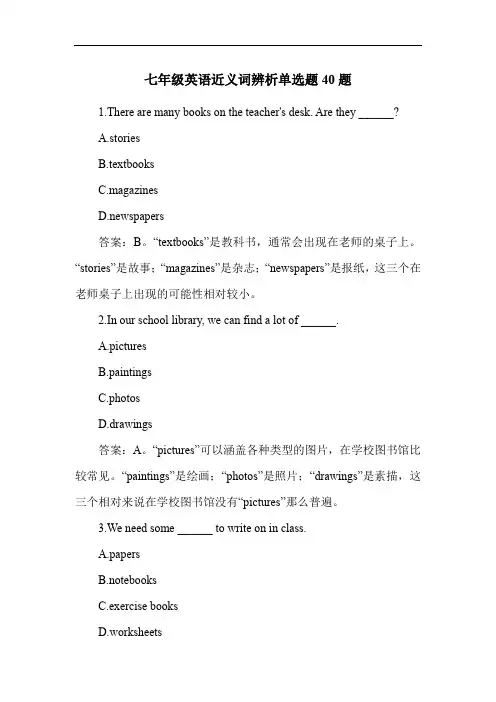
七年级英语近义词辨析单选题40题1.There are many books on the teacher's desk. Are they ______?A.storiesB.textbooksC.magazinesD.newspapers答案:B。
“textbooks”是教科书,通常会出现在老师的桌子上。
“stories”是故事;“magazines”是杂志;“newspapers”是报纸,这三个在老师桌子上出现的可能性相对较小。
2.In our school library, we can find a lot of ______.A.picturesB.paintingsC.photosD.drawings答案:A。
“pictures”可以涵盖各种类型的图片,在学校图书馆比较常见。
“paintings”是绘画;“photos”是照片;“drawings”是素描,这三个相对来说在学校图书馆没有“pictures”那么普遍。
3.We need some ______ to write on in class.A.papersB.notebooksC.exercise booksD.worksheets答案:C。
“exercise books”是练习本,专门用来在课堂上书写。
“papers”是纸张;“notebooks”是笔记本,不一定专门用于课堂书写;“worksheets”是工作表,与在课堂上直接书写不太符合。
4.The students are reading ______ in the classroom.A.articlesB.storiesC.novelsD.poems答案:A。
“articles”文章,比较符合学生在教室阅读的场景。
“stories”故事;“novels”小说;“poems”诗歌,这三个在教室阅读的普遍性不如“articles”。
5.We have many ______ in our school.A.classroomsB.officesboratoriesD.libraries答案:A。
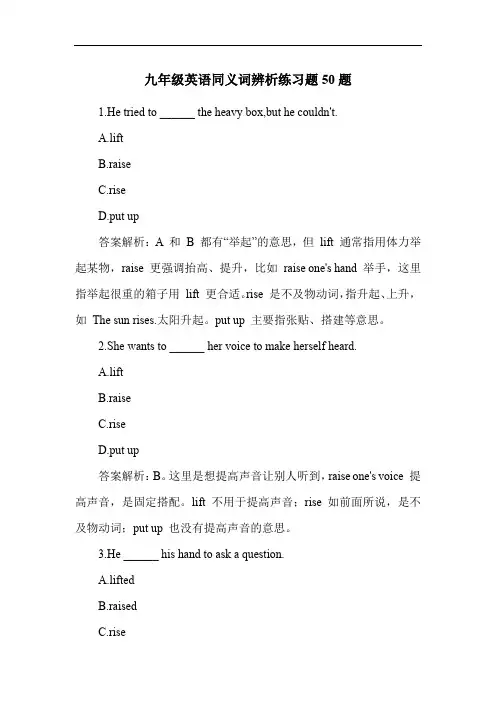
九年级英语同义词辨析练习题50题1.He tried to ______ the heavy box,but he couldn't.A.liftB.raiseC.riseD.put up答案解析:A 和B 都有“举起”的意思,但lift 通常指用体力举起某物,raise 更强调抬高、提升,比如raise one's hand 举手,这里指举起很重的箱子用lift 更合适。
rise 是不及物动词,指升起、上升,如The sun rises.太阳升起。
put up 主要指张贴、搭建等意思。
2.She wants to ______ her voice to make herself heard.A.liftB.raiseC.riseD.put up答案解析:B。
这里是想提高声音让别人听到,raise one's voice 提高声音,是固定搭配。
lift 不用于提高声音;rise 如前面所说,是不及物动词;put up 也没有提高声音的意思。
3.He ______ his hand to ask a question.A.liftedB.raisedC.rise答案解析:B。
raise one's hand 举手,是固定搭配。
lift 也有举起的意思,但这里举手的固定表达是raise one's hand。
rise 是不及物动词;put up 有搭建、张贴等意思,不符合语境。
4.The workers are ______ the big stones.A.liftingB.raisingC.riseD.put up答案解析:A。
这里指工人在搬起大石头,用lift 更强调用体力举起。
raise 更多是抬高、提升的意思;rise 是不及物动词;put up 不用于搬石头。
5.She ______ from her seat to welcome the guests.A.liftedB.raisedC.roseD.put up答案解析:C。
七年级英语同义词辨析练习题40题1.I often go to school by bike. Sometimes I walk to school. The underlined words “go” and “walk” can be replaced by _____.A.runB.moveC.travelD.leave答案:C。
“go”和“walk”在这里都表示去学校的方式,“run”是跑,不符合;“move”移动,不太恰当;“travel”有出行、前往的意思,可以替换“go”和“walk”;“leave”是离开,不符合语境。
2.We start our classes at eight o'clock. The underlined word “start” can be replaced by _____.A.beginB.openunchD.start off答案:A。
“start”和“begin”都有开始的意思,可以互换;“open”主要是打开的意思;“launch”通常指发射、推出;“start off”虽然也有开始的意思,但比较口语化,不太适合这个语境。
3.The teacher asks us to finish our homework on time. The underlined word “finish” can be replaced by _____.A.endpleteC.stopD.close答案:B。
“finish”和“complete”都表示完成的意思,可以互换;“end”更多的是指结束、终止;“stop”是停止;“close”主要是关闭的意思。
4.We have a lot of fun in the playground. The underlined word “have” can be replaced by _____.A.getB.takeC.enjoyD.like答案:C。
初二英语词汇近义词区分练习题30题(带答案)1. I often _ my homework with a pen, not a pencil.A. writeB. draw答案:A。
解析:write表示写,通常用于书写文字,如写作业、写信等,do one's homework(做某人的作业)是常见搭配;draw表示画,主要强调绘画这个动作,如draw a picture 画一幅画),这里说用钢笔做作业,是书写文字,所以用write。
2. My _ is a teacher.A. fatherB. dad答案:A。
解析:father比较正式,dad更口语化、亲昵。
在这种描述职业的比较正式的语境下,father更合适。
3. We _ the classroom every day.A. cleanB. clear答案:A。
解析:clean表示打扫、清洁,clean the classroom(打扫教室)是常见用法;clear主要表示清除、使清澈等,如clear the table 收拾桌子,把东西拿走使桌子干净),这里打扫教室用clean。
4. I _ a book from the library yesterday.A. borrowedB. lent答案:A。
解析:borrow表示借入,borrow sth. from sb. / someplace 从某人/某地借入某物);lend表示借出,lend sth. to sb. 把某物借给某人),这里从图书馆借书是借入,所以用borrow。
5. There are many _ in the park.A. treesB. woods答案:A。
解析:tree是可数名词,复数形式trees表示多棵树;wood作可数名词时表示树林,woods表示森林,这里说公园里有很多树,用trees更合适。
6. She _ to school by bike every day.A. goesB. rides答案:A。
初二英语词汇近义词区分练习题50题(带答案)1. I need a ____ to write my homework.A.penB.pencil答案:A。
解析:pen是钢笔,pencil是铅笔,钢笔写出的字不易修改,铅笔写出的字可以用橡皮擦修改,写作业一般用钢笔更正式一些。
2. My mother uses a ____ to cut the vegetables.A.knifeB.saw答案:A。
解析:knife是刀,用于切菜等厨房操作,saw是锯子,用于锯木头等,功能不同。
3. There is a ____ on my desk to tell the time.A.clockB.watch答案:A。
解析:clock通常指放在桌上等固定位置的时钟,watch 是戴在手腕上的手表。
4. I put my books in a ____.A.bagB.box答案:A。
解析:bag一般指书包等软质的装东西的袋子,box是盒子,形状较方正且硬。
5. We use a ____ to clean the floor.A.broomB.brush答案:A。
解析:broom是扫帚,用来清扫大面积的地板等,brush 是刷子,用途更广泛,如刷鞋等。
6. I have a ____ to keep my money.A.walletB.purse答案:A。
解析:wallet主要指男式的钱包,purse常指女式的钱包。
7. There is a ____ on the wall to make the room bright.mpB.light答案:A。
解析:lamp通常指有灯罩等具体形状的灯,light概念更宽泛。
8. I write important things on a ____.A.notebookB.diary答案:A。
解析:notebook是笔记本,可用于记录各种事情,diary 主要指日记,有一定的隐私性和日期记录特点。
七年级英语同义词辨析单选题30题1. I like to ______ TV in the evening.A. lookB. seeC. watch答案:C。
解析:look强调看的动作,是不及物动词,常与at连用;see强调看的结果,即看到;watch表示观看,通常用于观看电视、比赛等活动,这里说晚上看电视,用watch。
2. Can you ______ the bird in the tree?A. lookB. watchC. see答案:C。
解析:这里问能否看到树上的鸟,是强调看的结果,look强调动作,watch侧重于观看动态的事物,所以选see。
3. She often ______ at herself in the mirror.A. looksB. seesC. watches答案:A。
解析:look at表示看,这里说她经常看镜子中的自己,是强调看这个动作,see强调结果,watch侧重于观看动态事物,所以选looks。
4. My mother ______ a book every night.A. looksB. readsC. sees答案:B。
解析:read a book是固定搭配,表示读书,look强调动作,see强调结果,这里说妈妈每晚读书,所以选reads。
5. We should ______ both sides before crossing the road.A. lookB. seeC. watch答案:A。
解析:look表示看的动作,这里说过马路前要看两边,强调动作,see强调结果,watch侧重于观看动态事物,所以选look。
6. I can't ______ my keys. Where are they?A. lookB. findC. see答案:B。
解析:find表示找到,强调寻找的结果,look强调动作,see强调看到的结果,这里说找不到钥匙了,所以选find。
初一英语同义词辨析单选题30题1. I often ______ books in the library.A. lookB. readC. see答案:B。
解析:look强调看的动作,常与at连用,如look at the book;read 主要表示阅读书籍、报纸等文字性的东西,这里说在图书馆看书,用read合适;see强调看到的结果,例如I can see a bird。
所以这题选B。
2. -Can you ______ the blackboard? -Yes, I can.A. lookB. watchC. see答案:C。
解析:look表示看的动作,后面要加at才能接宾语;watch主要是观看电视、比赛等动态的事物;see强调看到的结果,这里问能否看到黑板,是问结果,所以选C。
3. My mother ______ a new dress yesterday.A. lookedB. sawC. bought答案:C。
解析:look表示看的动作,不符合语境;saw是see的过去式,意为看到;bought是buy的过去式,意为购买,根据句子说妈妈昨天一件新裙子,应该是买了新裙子,所以选C。
4. We ______ a football game on TV last night.A. lookedB. watchedC. saw答案:B。
解析:look强调看的动作,常和at连用;watch表示观看比赛、电视节目等;see强调看到的结果。
这里说在电视上观看足球比赛,用watch,所以选B。
5. I can't ______ my pen. Where is it?A. look forB. findC. look at答案:B。
解析:look for表示寻找的动作,强调找的过程;find表示找到,强调找的结果;look at表示看。
这里说找不到钢笔,是说结果,所以选B。
6. -______! There is a car coming. -Thank you.A. LookB. SeeC. Watch答案:A。
初中英语近义词辨析专项练习题完形填空专项训练一1. tell, talk, say, speak(1)tell 告诉,叙述tell sb. sth.=tell sth. to sb.告诉某人某事(2)talk交谈talk to/with sb. 和某人谈话talk about sth. 讨论某事(3)say 说,重申说的内容say hello to sb.向某人问好(4)speak 说某种语言练习 1 :1. Can you_________ me the truth? 2. What language do you__________?3.This is what they__________ yesterday.4.Don’t__________ in class,please be quiet. 2. look, look at, see, watch(1)look 看起来look+ 形容词(2)look at 朝 ?看重申看的动作(3)see 看见重申看的结果(4)watch 观看特别指看电视,看球赛等练习 2 : 1. The coat__________ nice, I want to buy onefor my daughter. 2. Please_____________ the blackboard, canyou___________ anything? 3. She doesn’ t like__________ TV, but she likes_____________ football game.3. sound,listen to, hear (1) sound 听起来sound+形容词(2) listen to 听重申听的动作(3) hear 听见重申听的结果练习 3 : 1. ____________the radio, it says the flood is coming soon. 2. I can’t__________ you , because there’s something wrong with my ears. 3. What you said____________ interesting. 4. receive, accept (1)receive 收到重申客观接受(2)accept 接受,收下重申主观接受She received his letter but she can’t accepted his love. 练习 4 :He___________ a present yesterday, but he didn’t ___________ it, because it was too expensive. 5.look up, look for, find, find out(1)look up 查字典、书、电话簿等,代词放中间look it up (2)look for 找寻重申找的动作(3)find 找到强调找的结果(4)find out 发现结果指经过努力而发现的结论练习 5:1.He often takes a dictionary and______________ the new words in it?2.The little girl______________ her pen everywhere but didn’t_____________ it at last.3. Look! Lucy is crying over there. Let’s go and_____________ why isshe crying. 6. keep, borrow, lend(1)keep 借能够保存一段时间(2)borrow 借重申将东西接进来borrow...from 从 ...... 借来(3)lend 借重申将东西借出去lend ...to 借给练习6: 1. ---My bike is broken, can I___________ yours ,Lily?---Oh, sorry, I’ve_________ it to Sandy. 2. You can___________ my recorder for three days. 3. We often___________ books from our school library. 4. Heoften___________ money to his brother.7. reach, arrive, get(1)reach 抵达,够得着是个及物动词(2)arrive到达不及物动词arrive in+ 大地址arrive at+小地址(3)get 抵达不及物动词get to到达练习7 : 1.They will__________ in Chengdu next week. 2. How do you ____________to school every day? 3. Use a longer stick, then you can____________ the apples.8. thanks to, thanks for (1)thank to 幸好,于(2)thanks for 因 ?感谢练习 8: 1. ___________ your help, I’ve understand it.2. _____________ the cats, mice dare not come and eat my food. 9. give in, give up (1)give in 投诚(2)give up 放弃give up doing sth. 放弃做某事练习 9: 1. We shouldn ’t____________ learning English! 2. I would rather die than____________ before my enemies.10. achieve,come true(1)achieve 实现及物动词,主语一般为人(2)come true 实现不及物动词组,主语为梦想,理想练习10: 1. He works so hard that he is sure to____________ his dream. 2. His prediction of human’s flying to the moon __________________.11. turn off, close, turn on,open(1)turn off关turn on开(2)close 关open 开练习 11: 1. _______________ the windows please, ’it s so cold outside. 2. ____________ the lights before you leave the room. 3. The dog ____________ the box and took the bone out! 4. _____________ the TV,I want to watch the NBA basketball games.12. break off, break out, break into, break down (1)break off 中止关系,忽然停止(2)break out 指战争迸发(3)break into 非法进入或闯进(4)break down 坏掉,抛锚,半途不工作练习12: 1 He was late for school yesterday, becausehis car ____ on the half way. 2 The World WarⅡ____ when she was only five.3 They ____ their friendship and didn’t talk to each other any more.4 Last night a thief _____ my house and took away my TV.13. reply, answer, solve (1)reply 答复,答复不及物动词reply to sb. (2)answer 回答 ,答案及物动词answer question (3)solve 解决,处理及物动词solve problem 练习 13: 1. What did Mr. Smith___________ to what others said? 2. No one in our class can__________ this question. 3. It ’s too difficult for everyone to___________ that problem. 4. She failed to ____________ my question.5.We haven’t __________ to his letter yet.6.None of us knew the ____________ to the problem.14. hope,wish (1)hope 希望 , 指较为现实的想法hope to do 或 hope + 从句,但没有 hope sb to do (2)wish 希望,指不太现实的要求或想法wish to do 或 wish sb todo 练习14:1. ---The weather may be fine tomorrow. ---I_________ so.3.Mum _________me to be a doctor in the future.4. How I_________I could fly to the moon! 15. take, cost, spend, pay (1)take 花销 , 尤指花销时间 ,主语为物it takes sb. some time to do sth. (2)cost 花销 , 指花金钱,主语为物sth. cost sb. some money (3)spend 花费 , 主语为人spend...(in) doing 或spend...on sth.(4)pay 花销 , 主语为人pay for 练习 15: 1. It often_____________ about 3 hours to get to school from my home. 2. ---Who will ____ for the bill? ---Maybe our boss. 3. The house_________ him 30,000 dollars.4. His cousin__________ the whole day making the toy car yesterday.16. take part in, join, attend (1)take part in 参加某项活动(2)join指参加某组织,成为此中的一个成员(3)attend 指参加会议,婚礼,葬礼,典礼;去上课,上学,听报告等练习 16:1. Mr. Wang____________ the Party 5 years ago. 2. They invited Lily_____________________ the English evening. 3. He’ll _________ an important meeting tomorrow. 17. do with ,deal with (1)do with 办理,对付在问句中要与what 连用 (2)deal with办理,对付在问句中要与 how 连用练习 17: 1. How can you______________ that problem? 2. What do you______________ the event?18. put on, wear, dress, in(1)put on 穿上重申穿衣的动作(2)wear 衣着重申穿的状态,是一个持续性动词(3)dress 给?穿衣服宾语为人dress oneself 给某人自己穿衣服(4)in 衣着重申衣着的状态be in+ 颜色练习18 : 1. ___________ the warm clothes, it’s coldoutside. 2. Mary is always_________ red clothes . Maybe red is her favorite color. 3. The little boy could____________ himself when he wasthree years old. 4. The old man___________ a pair of glasses.19. win, beat,defeat (1) win 博得一般指博得竞赛,奖品或战斗,宾语为物(2) beat 战胜,战胜一般指战胜参加竞赛或游戏的人或集体,宾语为人 (3)defeat 战胜,战胜一般指战场上战胜仇敌,宾语为人练习19:1. Our team has___________ the football match, we are all happy. 2. The Brazilian football team________ us 5-0 inthat match, all the Chinese fans were very sad. 3. The army___________ the enemy at last. 20. be made in, be made of, be made from, be made up of (1)be made in 在哪里制作,后边接产地(2)be made of ?制成,看得出原料 (3)be made from?制成,看不出原料(4)be made up of?构成,重申个体构成整体练习 20:1. The desk__________________ wood.2. This kind of watch___________________ Shanghai.3. Our class _________________ 50 students.4. Paper_____________________ bamboo.21.have been to, have gone to(1)have been to 以前去过,可与次数连用(2)have gone to 已经去了练习21:1.They _________________ Italy for more than 7 years, so Italy is their second home. 2. ---How many times_____________________ Hainan?---Only 3 times. 22. too much, much too,too many, many too (1)toomuch 太多too much+不行数名词(2)much too 太...... much too+形容词(3)too many 太多too many+可数名词复数(4)many too 用法不存在练习 22: 1. The computer is________________ expensive. 2. Stop, Peter. You talked _____________. 3. Don’t eat____________ apples every day. , have a rest. You ’ ve ______________ tired today. up! You have wasted _________________ time. 23. many, much , lots of , a lot ( of )(1)many 很多many+可数名词复数 (2)much 很多much+不可数名词(3)a lot of/lots of 很多a lot of/lots of+可数名词复数 /不行数名词(4)a lot 很,特别 a lot 修饰动词练习23: 1. ____________ of the visitors are workers. 2. Has Jack have _____________ money? 3. During those three weeks, he ate ______________ meat. 4. I did not understand why you had so ______________ strange questions. 5. Although he is a boy, he reads ______________. 24. above all ,after all , first of all , at all, in all (1)above all 最重要的是 , 特别是,强调要惹起特别注意(2) after all 毕竟 , 终归 (3) first of all 第一 , 重申序次(4) at all 根本,丝毫否认 +at all (5)in all 总合, 总计练习25:1. Never waste anything, but _______________ never waste time.2.______________, let meintroduce myself to you. 3. There are 35 students_____________ in our class. 4. He is still a child _____________. Don’ t blame him. don ’ t know him ______________. 26. passed, past (1)passed 经过动词 pass 的过去式或过去分词 (2)past 经过介词或副词练习 26: 1. They hurried _____________ the building. 2. Tom ____________ by me without greeting just now. 3. The train for the small town leaves at ten __________ eight. 4. Two weeks had ____________ since Martin had seen him. 5. In the _________, I have had many jobs.27. agree to, agree with, agree on(1) agree to表示一方提出一项建议、安排、计划等,另一方赞同协作(2) agree with 表示赞同某人或某人的建议、想法、剖析、解说等;“合适”的意思。
精选公文范文,管理类,工作总结类,工作计划类文档,欢迎阅读下载初中英语近义词辨析专项练习题完形填空专项训练1. tell, talk, say, speak (1)tell 告诉,讲述tell sb. sth.=tell sth. to sb. 告诉某人某事(2)talk 交谈talk to/with sb. 和某人交谈talk about sth. 谈论某事(3)say 说,强调说的内容say hello to sb. 向某人问好(4)speak 说某种语言练习 1 :1. Can you _________ me the truth? 2.What language do you3. Thisis whatthey?■yesterday. in class,please be look at, see, watch look+ 形容词强调看的动作强调看的结果尤其指看电视,看t ________2. look,看起来at朝?看看见nice, I want to buy one______________________4. Don ' quiet.(1) look(2) look(3) see(4)watch 观看球赛等练coatfor my daughter. 2. Please the blackboard, canyou __________ anything? 3. Shedoesn' t like __________ TV, but she likes ____________ football game.3. sound,listen to, hear (1) sound 听起来sound+形容词(2) listen to 听强调听的动作(3) hear 听见强调听的结果练习 3 : 1. ___________ the radio, it says the flood is coming soon. 2. I ca n ' t ___________ you , because there's something wrong with my ears. 3. What you said interesting. _____ 4.receive, accept (1)receive 收到强调客观接受(2)accept 接受,收下强调主观接受She received his letter but she can't accepted his love. 练习4:He ____________ a present yesterday, but he didn't ___________ it, because it was too expensive. 5. look up, look for, find, find out ----------------------------------------- 精选公文范文,管理类,工作总结类,工作计划类文档,感谢阅读下载-----------------------------------(1) _____________ look up 查词典、书、电话簿等,代词放中间look it up (2)look for 寻找强调找的动作(3)find 找到强调找的结果(4)find out 发现结果指经过努力而发现的结论练习5: 1. He often takes a dictionary and the new words in it?2. The little girl ______________ her pen everywhere but didn't ____________ it at last.3. Look! Lucy is crying over there.Let's go and _________________ why isshe crying. 6. keep, borrow, lend(1) keep 借可以保留一段时间(2) borrow 借强调将东西接进来borrow...from 从..... 借来(3)lend 借强调将东西借出去lend...to 借给练习6: 1. ---My bike is broken, can I ___________ yours ,Lily? ---Oh, sorry, I've _________ it to Sandy. 2.You can ___________ my recorder for three days. 3. We often ______________ books from our school library. 4. He -------- 精选公文范文,管理类,工作总结类,工作计划类文档,感谢阅读下载-----------------------------------often __________ money to his brother.will _________ in Chengdu next week. 2.How do you ___________ to school every day? 3. Use a longer stick, then youthanks to, thanks for (1)thank to 幸亏,于__________ your help, I 've understand it.2. ____________ the cats, mice dare not come and eat my food. 9. give in, give up(1)give in 投降 (2)give up 放弃 give up doing sth. 放弃做某事 练 习 9 : 1. We shouldn 't ___________ learning English! 2. Iwould rather die than _______________ before my enemies. 10. achieve, ----------- 精选公文范文,管理类,工作总结类,工作计划类文档,感谢阅读下载 --------------come true(1)achieve 实现 及物7. reach, arrive, get 够得着(2) arrive 到 达 arrive in+ 大地点 (1)reach 到达, 是个及物动词 不及物动词 arrive at+小地点(3)get 到达 to 到 达 练 习 不及物动词 get 7 : 1. They can ___________ the apples.(2)thanks for 因 ?谢谢 练习1.动词,主语一般为人(2)come true 实现不及物动词组,主语为梦想,理想练习10: 1. He works so hard that he is sure to ____________ his dream. 2. His prediction of human's flying to the moon _________________ . 11. turn off, close, turn on, open (1)turn off 关turn on 开(2)close 关open 开练习11: 1.______________ the windows please, 'it s so cold outside. 2. _____________ the lights before you leave the room. 3. The dog ___________ the box and took the bone out! 4. _________________ the TV,I want to watch the NBA basketball games.12. break off, break out, break into, break down (1)break off 中断关系,突然终止(2)break out 指战争爆发(3)break into 非法进入或闯入(4)break down 坏掉,抛锚,中途不工作练习12: 1 He was late for school yesterday, because ----------- 精选公文范文,管理类,工作总结类,工作计划类文档,感谢阅读下载-----------------------------------his car ___ on the half way. 2 The World War n ____ when she was only five.3 They ____ their friendship and didn't talk to each other any more.4 Last night a thief _____ my house and took away my TV. 13. reply, answer, solve (1) reply 回复,答复不及物动词reply to sb. (2)answer 回答,答案及物动词answer question (3)solve 解决,处理及物动词solve problem 练习13: 1. What did Mr. Smith __________ to what others said? 2. No one in our class ca n _________ th i s question. 3. It ' s too difficult for everyone to __________________ t hat problem. 4. She failed to ___________ my question.5. We haven't _________ to his letter yet.6. None of us knew the ___________ to the problem. 14. hope, wish(1) -- hope 希望, 指较为现实的想法hope to do 或hope + 从句,但没有hope sb to do (2)wish 希望,指不太现实的要---------------------------------------------------------------------- 精选公文范文,管理类,工作总结类,工作计划类文档,感谢阅读下载-----------------------------------求或想法wish to do 或wish sb to do 练习14: 1. ---The weather may be fine tomorrow. ---I ____________ so.3. Mum _________ me to be a doctor in the future.4. How I ________ I could fly to the moon! 15. take, cost, spend, pay (1)take 花费, 尤指花费时间,主语为物it takes sb. some time to do sth. (2)cost 花费, 指花金钱,主语为物sth. cost sb. some money(3) spend 花费, 主语为人spend...(in) doing 或spend...on sth.(4) pay 花费, 主语为人pay for 练习15: 1. It often _____________ about 3 hours to get to school from my home. 2. ---Who will _________ for the bill? ---Maybe our boss. 3. The house him 30,000 dollars.4. His cousin __________ the whole day making the toy car yesterday. 16. take part in, join, attend (1)take part in 参加某项活动(2)join 指参加某 ---------------------------------------- 精选公文范文,管理类,工作总结类,工作计划类文档,感谢阅读下载--------------------------------- ~ 7精选公文范文,管理类,工作总结类,工作计划类文档,感谢阅读下载 组织,成为其中的一个成员(3) attend 指参加会议,婚礼,葬礼, 典礼;去上课,上学,听报告等 练习 16:1. Mr. Wang _____________ the Party 5Lily ____________________ the English evening. 3. He 'll _________ an importantmeeting tomorrow. 17. do with ,deal with 在问句中要与 处理,对付 练习 17 : (1)do with 处理,应付 what 连用 (2)deal with 在问句中要与 how 连用 1. How can you _____________ that problem? 2.What do you ______________ the event?穿上 强调穿衣的动作 (2)wear 穿着 强调穿的状态,是一个延续性 动词 (3)dress 给?穿衣服 宾语为人 dress oneself 给某人自己 穿衣服(4)in 穿着 强调穿戴的状态__________ the warm clothes, it 's cold years ago.2. They invited . put on, wear, dress, in (1)put on be in+ 颜 色 练 习 18 :1.精选公文范文,管理类,工作总结类,工作计划类文档,欢迎阅读下载outside. 2. Mary is always _________ red clothes . Maybe red is her favorite color.3. The little boy could ___________ himself when he was three years old.4. The old man a pair of glasses.19. win, beat,defeat (1) win 赢得一般指赢得比赛,奖品或战斗,宾语为物(2) beat 战胜,打败一般指打败参加比赛或游戏的人或团体,宾语为人(3)defeat 战胜,打败一般指战场上打败敌人,宾语为人练习19:1. Our team has __________ t he football match, we are all happy.2. The Brazilian football team ______________ us 5-0 in that match, all the Chinese fans were very sad.3. The army __________ the enemyat last. 20. be made in, be made of, be made from, be made up of (1)be made in 在哪里制作,后面接产地(2)be made of ?制成,看得出原料(3)be made from? 制成,看不出原料(4)be made up of? --------------------------- 精选公文范文,管理类,工作总结类,工作计划类文档,感谢阅读下载------------------------------------- ~ 9 ~组成,强调个体组成整体练习20: 1. The desk ____________________ wood. 2. This kind of watch ______ Shanghai. 3. Our class ________________ 50 students.4. Paper ____________________ bamboo.21. have been to, have gone to (1)have been to 曾经去过,可与次数连用(2) ______________________ have gone to 已经去了练习21 : 1. They Italy for more than 7 years, so Italy is their second home. 2. ---How many times ___________________ Hainan?---Only 3 times. 22. too much, much too, too many, many too (1)too much 太多too much+不可数名词(2) .............................. m uch too 太much too+形容词(3)too many 太多tooman y+可数名词复数(4)ma ny too 用法不存在练习22: 1. The computeris _______________ expensive. 2. Stop,Peter. You talked ____________ . 3. Do'n 精选公文范文,管理类,工作总结类,工作计划类文档,感谢阅读下载t eat ______________ apples everyday. , have a rest. You ' ve _____ tired today. up! You have wasted _____ time. 23. many, much , lots of , a lot ( of ) (1)ma ny 许多ma ny+可数名词复数(2)much 许多much+不可数名词(3)a lot of/lots of 许多 a lot of/lots of+可数名词复数/不可数名词(4)a lot 很,非常 a lot 修饰动词练习23:1. of thevisitors are workers. 2. Has Jack have ___ money? 3. During those three weeks, he ate ____________meat. 4. I did not understand why you had so __________________________ strange questions. 5. Although he is a boy, he reads _____________ . 24. above all ,after all ,first of all ,at all, in all(1)above all 最重要的是, 尤其是,强调要引起特别注意(2) after all 毕竟, 终究(3)first of all 首先, 强调次序精选公文范文,管理类,工作总结类,工作计划类文档,感谢阅读下载(4) at all 根本,丝毫否定+at all (5)in all 总共, 总计练习25: 1. Never waste anything, but ___ never waste time.2. ____________ , let me introduce myself to you.3. There are 35 students ____________ in our class.4. He is still a child ______________ . Don' t blame him. don ' t know him . 26. passed, past (1)passed 经过动词pass 的过去式或过去分词(2)past 经过介词或副词练习26 : 1. They hurried____________ the building. 2. Tom by me without greeting just now. 3. The train for the small town leaves at ten eight. 4. Twoweeks had ____________ since Martin had seen him. 5. In the ________ , I have had many jobs. 27. agree to, agree with, agree on (1) agree to 表示----------- 精选公文范文,管理类,工作总结类,工作计划类文档,感谢阅读下载-------------一方提出一项建议、安排、计划等,另 一方同意协作 (2) agree with 表示 同意某人或某人的意见、想法、分析、 解释等; “适合 ”的意思。